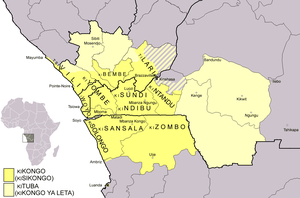Kongo language: Difference between revisions
No edit summary |
Tweak alternate name |
||
| Line 15: | Line 15: | ||
|iso1=kg|iso2=kon|iso3=kon |
|iso1=kg|iso2=kon|iso3=kon |
||
}} |
}} |
||
'''Kikongo''' |
'''Kikongo''' ('''Kongo language''') is the [[Bantu language]] spoken by the [[Bakongo]] and [[Bandundu]] people living in the tropical forests of the [[Democratic Republic of the Congo]], the [[Republic of the Congo]] and [[Angola]]. It is a [[tonal language]] and formed the base for [[Kituba]], a Bantu creole and [[lingua franca]] throughout much of west central [[Africa]]. It was spoken by many of those who were taken from the region and sold as slaves in [[the Americas]]. For this reason, while Kongo still is spoken in the above-mentioned countries, creolized forms of the language are found in ritual speech of African-derived religions in [[Brazil]], [[Jamaica]], [[Cuba]] and especially [[Haiti]]. It is also one of the sources of the [[Gullah]] people's language and the [[Palenquero]] creole in [[Colombia]]. The vast majority of present-day speakers live in Africa. There are roughly seven million native speakers of Kongo, with perhaps two million more who use it as a [[second language]]. |
||
[[File:Kikongo-m.jpg|thumb|left|Prayer in Kongo]] |
[[File:Kikongo-m.jpg|thumb|left|Prayer in Kongo]] |
||
Revision as of 21:00, 26 June 2009
| Kongo | |
|---|---|
| Kikongo | |
| Native to | |
| Region | Central Africa |
Native speakers | 7 million |
| Official status | |
Official language in | |
| Language codes | |
| ISO 639-1 | kg |
| ISO 639-2 | kon |
| ISO 639-3 | kon |
Kikongo (Kongo language) is the Bantu language spoken by the Bakongo and Bandundu people living in the tropical forests of the Democratic Republic of the Congo, the Republic of the Congo and Angola. It is a tonal language and formed the base for Kituba, a Bantu creole and lingua franca throughout much of west central Africa. It was spoken by many of those who were taken from the region and sold as slaves in the Americas. For this reason, while Kongo still is spoken in the above-mentioned countries, creolized forms of the language are found in ritual speech of African-derived religions in Brazil, Jamaica, Cuba and especially Haiti. It is also one of the sources of the Gullah people's language and the Palenquero creole in Colombia. The vast majority of present-day speakers live in Africa. There are roughly seven million native speakers of Kongo, with perhaps two million more who use it as a second language.


It is also the base for a creole used throughout the region: Kituba also called Kikongo de L'état or Kikongo ya Leta ("Kongo of the state" in French or Kongo), Kituba and Monokituba (also Munukituba). The constitution of the Republic of the Congo uses the name Kitubà, and the one of the Democratic Republic of the Congo uses the term Kikongo, even if Kituba is used in the administration.
Writing
- While the complete Christian Bible was first published in Kongo in 1905, Kongo was the earliest Bantu language which was committed to writing in Latin characters and had the earliest dictionary of any Bantu language. A catechism was produced under the authority of Diogo Gomes, a Jesuit born in Kongo of Portuguese parents in 1557, but no version of it exists today. In 1624 Mateus Cardoso, another Portuguese Jesuit edited and published a Kongo translation of the Portuguese catechism of Marcos Jorge. The preface informs us that the translation was done by Kongo teachers from São Salvador (modern Mbanza Kongo) and was probably partially the work of Félix do Espírito Santo (also a Kongo). The dictionary was written in about 1648 for the use of Capuchin missionaries and the principal author was Manuel Reboredo, a secular priest from Kongo (who became a Capuchin as Francisco de São Salvador). In the back of this dictionary is found a sermon of two pages written only in Kongo. The dictionary has some 10,000 words.
English words of Kongo origin
- The Southern American English word "goober", meaning peanut, comes from Kongo "nguba".[1]
